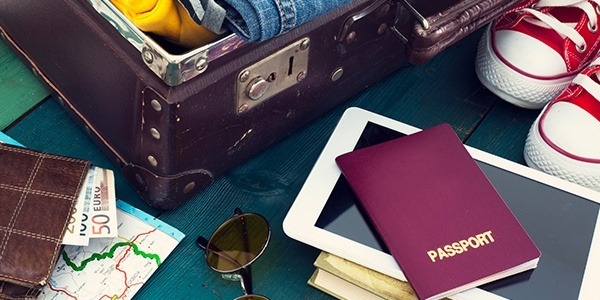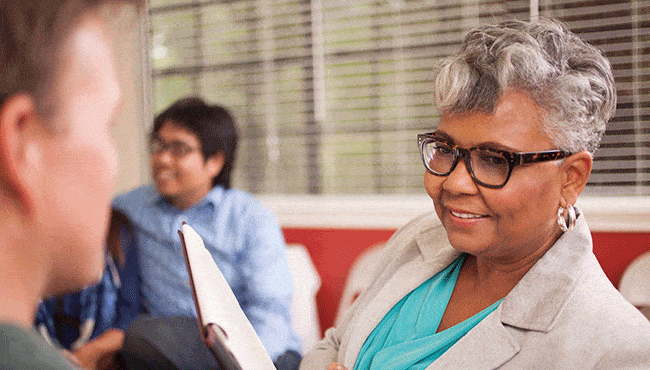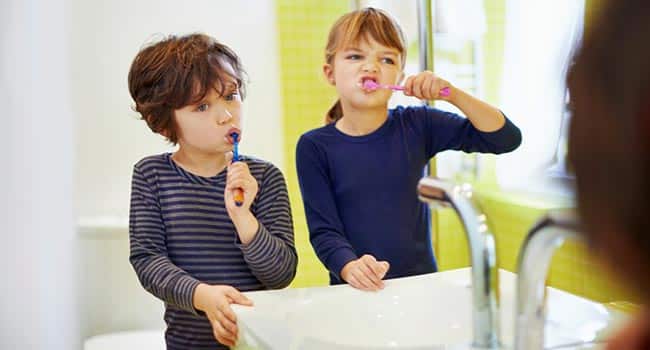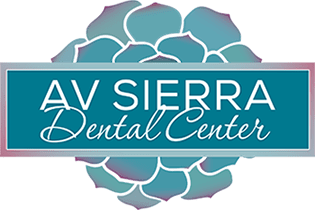Dental Travel Tips

Summer’s approaching fast, and with it comes road trips, family vacations, and travel plans. We’re all for travel and vacations, but just because you’re going on vacation doesn’t mean you can take a break from oral hygiene. We’re not saying you have to pack an electric toothbrush or a Waterpik® if you’re going camping for the weekend, but you should make an appropriate plan to continue caring for your teeth and gums… or else you could end up with an unpleasant souvenir from your trip: a cavity. Make it easy for yourself with travel supplies. Packing for a trip, whether a road trip or an overseas flight, is always a pain. You never have enough room for everything you want to bring, or you forget something you definitely need (like a toothbrush). Prepare ahead by having a small case or bag with all the travel necessities—toothbrush, toothpaste, floss or picks, and mouth rinse, for starters. Travel sizes aren’t the most economical way to purchase supplies, but they are convenient and ensure you can breeze through security checks at the airport. [spacer size=”20″] Ditch the toothbrush case. Sure, it might not feel good to think about your toothbrush jostling up against shampoo, soap, deodorant, and all the other items you’ve got in your toiletries bag… but it’s not as bad as sealing a wet toothbrush inside a plastic case that doubles as a bacteria breeding ground. You can always wash your toothbrush with hot water when you get where you’re going. [spacer size=”20″] Carry on your supplies. A quick brush, floss, and rinse can do wonders to help you feel refreshed on a long flight or when you get to the airport—and going carry-on will save you headaches if your luggage is delayed. But don’t obsess about it. You’ll be able to get new replacements at a drugstore almost anywhere you go. [spacer size=”20″] Stick to your routine. When traveling, it’s all too easy to get caught up in sightseeing, hiking, and dining out. In fact, that may be the entire point of some vacations. But oral hygiene is one of those things where the routine matters. Remember to brush at night before bed, in the morning after waking up, and to floss at least once a day. [spacer size=”20″] If in doubt, use bottled water. In foreign countries, especially ones that are off the beaten path, play it safe by using bottled water for your oral hygiene routine. As a rule of thumb, if you’re going to avoid drinking tap water, then avoid using it for brushing. Thankfully, in these places, most hotels will provide a complimentary bottle or two every day. [spacer size=”20″] Stick with healthy snacks. When you’re on the go, whether in the car or out sightseeing, there’s a temptation to pick up junky snacks for a quick energy boost. Avoid doing so if you can. Not only is the energy from a candy bar or bottle of soda short-lived, sugary snacks and drinks give bacteria plenty of fuel to cause tooth decay. If you do give into temptation, you’ve packed your toothbrush in carry-on for a reason. Use it. And if you like to chew gum on a plane, stick with sugar-free. [spacer size=”20″] Finally, if you’re planning a long trip, consider a check-up before you go. When your departure date gets close, it’s easy to put off routine tasks until after your vacation. If one of those tasks is your dental checkup, reconsider. If you’ve got a nagging concern, like an achy tooth, get it taken care of before your vacation. The last thing anyone wants is a full-blown toothache ruining your vacation! [spacer size=”20″] We hope you’re all set to enjoy a great summer vacation, but don’t forget to take care of your teeth when you’re traveling. If you need to set an appointment for a check-up before you go, or if your schedule is just a little bit simpler during the summer months, call or visit our website to make your next appointment today.
Avoid Bad Breath for Good

In almost every social situation, there is one thing most people are concerned about: halitosis, better known as bad breath. It can be embarrassing for you, uncomfortable to other people, and potentially a deal breaker for a job interview or date. To make it even more difficult to manage, our bodies have a great way of blocking out constant smells, making it very hard to determine if we have bad breath before it’s too late. How do I know if I have bad breath? You can easily test how your breath smells to others with this simple test. Lick part of your arm and smell it after about 10 seconds. Now, licking your arm in public may seem weird (and have its own social consequences), this test can give you a good indication of how your breath smells. However, it may not always be accurate. The best thing you can do is be aware of what causes bad breath and prevent it before it happens to you. How do I Make my Breath Smell Better? Hygiene The most common cause of bad breath is straightforward; you have a dirty mouth. Bacteria live in your mouth, and when you eat, they eat. These odors are made worse by your tongue, which acts like a fleshy dish sponge, absorbing food particles and bacterial byproducts. If you think this is your issue–and it is best place to start–the best remedy to avoid bad breath is to brush and floss daily. This will help eliminate leftovers for the bacteria to eat. To further eliminate any odor, open your mouth and look at the back of your tongue. If looks like it’s covered in a white or brown substance, this could be the main source of your bad breath. Brush as far back on your tongue as you can with your toothbrush, or use a tongue scraper, which will do the job more efficiently. Dry Mouth Saliva keeps the mouth clean by washing away bacteria, plaque, and keeping the acidic levels in your mouth at the proper level. If your mouth is chronically dry, bacteria can take over, leading to bad breath. If you are experiencing dry mouth, be sure you are drinking plenty of water. Additionally, check to see if any medication you are taking causes dry mouth. If so, talk to your doctor about solutions or a potential change in medication, that can prevent your dry mouth and bad mouth smell. Specific Types of Food There are certain types of food that cause bad breath. No matter what you do, you won’t be able to avoid the unwelcome baggage they carry. Coffee, tuna, onion, and garlic have a tendency to stick around even after you brush your teeth. For example, as garlic is digested, sulfur compounds permeate your lungs and skin, meaning there isn’t much you can do to hide the smell. For the sake of everyone around you, don’t go to hot yoga after eating a clove of garlic. Disease Bad breath can also be a sign of something more significant. If you have ruled out the issues above, bad breath (along with other symptoms) can be related to diabetes, gum disease, kidney disease, and many more chronic conditions. If you think your bad breath is connected to a more serious ailment, contact your family doctor to learn more. How Do You Get Rid of Bad Breath That Won’t Go Away? If you can’t improve the smell of your breath on your own you may need to talk to your dentist. Dentists are able to look at your mouth and see what the potential cause of your bad breath is. They will have the expertise to notice if it’s plaque, debris on your tongue, or periodontal disease. They can also prescribe you medicine for halitosis such as antimicrobial toothpaste and mouthwash to take care of the issue. The dentist may determine that the issue may not be located in your mouth, and would then refer you to your family doctor. Come visit Drs. Oh and Couto at AV Sierra Dental Center if you have any more questions or concerns about halitosis.
Why do I Need Professional Teeth Cleanings?

Why do I Need Professional Teeth Cleanings? Let’s look at five reasons why you should get your teeth regularly cleaned. 1. We check for oral cancer With cancer, the sooner it’s detected the better chance you have of successfully getting rid of it. Oral cancer is no different. During each teeth cleaning, we check for any signs of oral cancer. 2. Cleanings help prevent cavities Brushing and flossing every day will do wonders in maintaining a healthy mouth. But, sometimes you may forget to floss, or maybe you had a few too many sodas and candy bars. Our dental hygienists will ensure that your mouth is free of plaque, and can also give you tips for your at-home cleaning if they see something you may not be doing. 3. Cleanings help prevent gum disease Gum disease can easily creep up on anyone. It is often painless until it becomes a bigger problem. When diagnosed with gingivitis, it can still be reversed with proper gum maintenance. Once gingivitis progresses to periodontal disease, it requires ongoing professional care to prevent further damage to your mouth. Professional cleanings at twice a year drastically reduce the risk of gum disease ever starting. 4. Having a healthy mouth contributes to a healthy life Poor oral health has been connected with diagnoses for diabetes, heart disease and pregnancy complications. Keeping your gums and teeth healthy will help prevent the occurrence of these diseases. 5. Regular cleanings are cheaper than taking care of oral problems Receiving two professional cleanings a year may be an expense you don’t like to see. However, teeth cleanings are much cheaper than other procedures, such as root canals, scaling and root planing, and dental implants. There is nothing better than a freshly cleaned mouth! Our dental hygienists will make sure you have pain free experience, and you can leave knowing you’ve taken a giant leap forward in maintaining a healthy smile. If you have more questions about our professional teeth cleanings, or if you’d like to schedule an appointment, please call your Palmdale dentist at 661.202.3542.
Teaching Kids to Care for Their Teeth

How to Teach Kids to Care for Their Teeth (and a Little about Why and When, Too) If you’re a parent, you’ve probably tried every type of motivation—reasoning, cajoling, nagging, threatening punishments, even bribery—to get your kids to do things that they just really need to do. Eating vegetables. Getting dressed for school. Going to bed. And yes, brushing their teeth. Oral Hygiene Is Important Good oral hygiene is about more than a winning smile. It contributes to our sense of self-esteem and confidence—and what parent doesn’t want a child who’s happy, confident, and proud of him or herself? What you might not know is that oral health contributes greatly to your—and your child’s—long-term holistic health. Poor oral health is linked to diseases including obesity, diabetes, and even heart disease. Encouraging your children to take care of their teeth sets them up for a lifetime of good oral health—and good health in general. Start early—but focus on the big picture One way to make sure children take oral hygiene seriously is by starting early. Wipe their gums with a soft washcloth after bottle feedings, and once their baby teeth come in, brush them twice a day with a soft toothbrush and water. Toddlers aged two to four can begin brushing by themselves, preferably for two minutes, but don’t use fluoride toothpaste until your child knows not to swallow it. Start flossing your children’s teeth around the same time, as their teeth start to fit closely together. If you haven’t already brought them in for a first dentist’s visit, now is the time to start as well. Children don’t have the coordination to do as thorough a job as adults. They may not even be able to use dental floss until they’re 10 or so.; (Floss picks are easier for young kids.). But the key is to begin building good oral hygiene habits early on in life. Make sure your children understand the basics: Brush twice a day. Floss every day. Avoid sugary foods and drinks. Visit a dentist regularly for checkups. Set a good example. “Do what I say, not what I do.” There’s always a temptation to tell others—kids, especially—to behave a certain way, even if we don’t always do so ourselves. Be kind to strangers. Share. Be generous. But children learn more by watching their parents and friends every day. If you take good care of your teeth, they’ll learn implicitly that oral hygiene is important and worth practicing. It’s understandable that bathroom routines are “private time,” but don’t be shy about brushing or flossing in front of little ones. They’ll pick up good habits that way. Make it fun! What parent hasn’t turned a boring or unpleasant chore into some sort of a game in order to convince a child to participate? The answer: zero. And that’s a fact. Here are some simple ways you can turn oral hygiene into something more fun for kids: Let Them Pick Their Toothbrush Kids often feel like they don’t have choices—so let them pick out a toothbrush with their favorite character on it or a toothpaste flavor they like. There are so many cute character-themed toothbrushes on the market that it should be easy to find a fun toothbrush to help make brushing enjoyable. Having a fun brush will help kids be more invested in brushing their teeth. You may even find a character-themed toothbrush you like for yourself. Play Creative Dental Games Turn brushing their teeth into something fun instead of a nightly chore. Encourage them to brush their stuffed toys’ teeth while telling them how important it is to brush and floss. Colgate has several dental game ideas that teach kids the importance of caring for their teeth and gums. Read Books About Teeth, Cleaning Teeth and Visiting the Dentist Many kids love bedtime stories. Use this fun activity to help prepare them to visit the dentist by reading them a story about dental care. Reward Them When you child does a good job brushing and flossing give them a reward. Candy may not be the best option here but perhaps you can give them a quarter or let them pick the 2nd book to read at bedtime. Perhaps a dental book? Remember, we’re here to help. Day-to-day hygiene routines are the foundation of lifelong oral health, so there’s no substitute for the time you spend with your children, teaching them the fundamentals of brushing and flossing. But at AV Sierra Dental Center, we’re here to help. When you bring your child in for a visit, let us know if you have any concerns or issues you’d like to discuss. We want to make sure that your kids have a positive, friendly, age-appropriate dental experience each and every time they come to our office.
What is The Best Dental Routine

You hear advice everywhere you go. Brush and floss daily. Use mouthwash to fight bad breath. One out of every four dentist recommends using a Waterpik. Dental health is very important, and as a consumer, there are a ton of options to pick from. To help make your dental hygiene routine easier, we’re going to cut through the noise with some simple suggestions about what a good routine looks like and what products you should consider using. The Basics We’ve mentioned this before—and so did your mom—you need to brush and floss daily. (In this case, she’s right.) However, you might not realize that to brush most effectively, timing matters! You should always brush your teeth before you eat breakfast. As you sleep, your salivary glands don’t produce as much saliva, enabling bacteria to grow and thrive. If you eat before brushing, more acid will be produced because of the overnight bacterial growth. Not everyone can fit brushing in first thing every morning. If you do decide to brush afterwards, try to wait at least 30 to 60 minutes, especially if you consume foods that contain citric acid (foods like orange juice, grapefruit, lemons, etc.). The citric acid weakens your enamel and brushing your teeth afterwards can be more damaging than beneficial. You only need to floss once a day. It doesn’t matter what time you floss, as long as you are doing it. If flossing requires too much dexterity, or you simply don’t like it, there are other options—but we’re not saying to give it up. If you can’t or just won’t floss, try alternatives like interdental brushes or floss picks. Go Above and Beyond Once you’ve mastered the basics of brushing and flossing, there are additional things you can do to make sure you have a clean, healthy mouth. Number one: mouthwash. Swish a little around your mouth and you instantly feel refreshed. But mouthwash can be more than just a mid-day pick-me-up, and different types of mouthwash have different benefits. Fluoride: This mouthwash provides an additional source of fluoride. If you use toothpaste and drink tap water containing fluoride, you probably get enough. However, your dentist may suggest using fluoride mouthwash if they see some troubled spots. Antiseptic: More commonly used, antiseptic mouthwash (like Listerine) kills bacteria. This will help with bad breath and the prevention of gingivitis. Another tool you can use is the Waterpik. The Waterpik shoots a small, high powered stream of water that you can use along your gumline and in between your teeth. It can be useful if you have pockets or wider gaps between your teeth. While the Waterpik is a great tool, it still isn’t a substitute for flossing. Note: If you have braces or other fixed items in your mouth, the Waterpik is especially valuable. Braces and fixed items can trap food next to your teeth for hours after eating, giving the bacteria in plaque a feast. After eating, use the Waterpik to clean out food that is stuck in your mouth. The Waterpik is also a great option for those who need to brush but may have just had citric acid in their meal. Since the dental market is enormous, new products and methods will always be emerging. Always do proper research before buying an item or switching your routine. A good rule of thumb to follow is to see if the product is endorsed by the American Dental Association. Remember, the best routine is the one you’re able to follow consistently. Routines will always be different depending on the person, so please don’t hesitate to reach out to AV Sierra Dental Center for more information on a routine that works for you.
